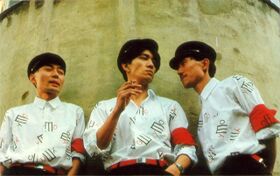The Hing La Band
This article is incomplete because it is pending further input from participants, or it is a work-in-progress by one author. Please comment on this article's talk page to share your input, comments and questions. Note: To contribute to this article, you may need to seek help from the author(s) of this page. |
The Hing La Band | |
|---|---|
 From left to right: Lei Zixin (drummer, vocalist), Jonny Qi (vocalist, guitarist), Tan Fengge (keyboard, synthesiser) | |
| Background information | |
| Also known as | Eternity (1979–81) The Tra-La-Las (1981) |
| Origin | Jindao |
| Genres | New wave, power pop, progressive pop |
| Years active | 1979–1990 |
| Members | Jonny Qi Lei Zixin Tan Fengge |
The Hing La Band (Xiaodongese: 兴拉乐队; Xìng lā yuèduì), also known as Eternity and briefly as The Tra-La-Las were a Jindanese new wave band formed in 1979 in the Hekou district of Jindao. For its eleven years of activity, the band consisted of Jonny Qi (guitarist and lead vocalist), Lei Zixin (drummer and backup vocals) and Tan Fengge (keyboard and synthesiser). Widely acclaimed as pioneers of new wave and prog-pop in Southwest Coius, The Hing La Band described their music as "future songs". Also known for their political messages directed towards anti-colonialism and anti-imperialism, The Hing La Band are sometimes credited with amplifying the wave of pro-Xiaodong sentiment in Jindao throughout the 1980s.
The band was formed in 1979 while all three members were still in college, releasing their debut album A Frantic Nightmare in 1979 to mixed critical reviews. Their debut followed a more art rock aesthetic, similar to established Estmerish acts such as Rickie Downer and Brunnie. They attempted to branch out into punk rock with their sophomore album Seven Snakes Slither Soundly in 1981, which was slammed by musical critics. Attempting to eschew their prior reputation after the commercial failure of Seven Snakes Slither Soundly, they briefly rebranded as The Tra-La-Las in 1981 before finally settling on The Hing La Band in November the same year. In 1982, they released their third album, but their first with a new wave focus, A Theory In Time, which received extremely positive reviews by critics and gave the group their first hit with Gaspar Groove.
Their fourth album, Northern Blights, was released in 1986, keeping the new wave influences but introducing a new theme of pro-Rongzhuo political messages into their music. Northern Blights was received much more controversially by critics, with some commending Qi for his songwriting while others lambasted the band for its political direction. In the late 1980s, the band began appearing at political rallies, and stopped touring in Estmere, insteading announcing their 1987 tour with a slate of shows in Xiaodong. Two years later, the band released what is considered to be their magnum opus, Fifty-Five, Forbidden, in 1989. Several songs from the album became symbols of Jindanese activism over the coming years, including in widespread protests in 1989 and 1990.
Following disagreements between members of the band, they disbanded in March 1990. Jonny Qi continued to make music through his prolific public image throughout the 1990s, and was seen as a Jindanese cultural icon during the band's active years. Gaullican music magazine Rythme ranked The Hing La Band 27th in its "Top 100 Most Influential Bands in History", and Fifty-Five, Forbidden was included in its "Top 20 Albums of the 1980s".
History
1979–81: Eternity and The Tra-La-Las
The band was first founded as Eternity in Jindao's fringe Hekou district in 1979 by Jonny Qi and Lei Zixin. At the time, both Qi and Lei were still studying at the Metropolitan College of the Arts in the Metropolitan district. Jonny Qi lived in his parents fourth-storey apartment in the Hekou district, while Lei Zixin lived with his girlfriend, Mao Liqiu, in the Little City of Shilou. Tan Fengge joined the band a few months after its formation, shortly after Qi and Lei had recorded the band's first demos.
1981–86: A Theory In Time and Northern Blights
1986–90: Political activism, Fifty-Five, Forbidden and breakup
Influences
Members
- Jonny Qi (1979–1990); lead vocals, guitar
- Lei Zixin (1979–1990); drums, backing vocals
- Tan Fengge (1979–1990); keyboard, synthesiser
Discography
Studio albums
- A Frantic Nightmare (1979)
- Seven Snakes Slither Soundly (1981)
- A Theory In Time (1982)
- Northern Blights (1986)
- Fifty-Five, Forbidden (1989)
Live albums
- The Early Years: The Hing La Band 1979–1981 (1982)
- Live at Metro! (1983)
- Live in Morwall! (1983)
- Live in Keisi! (1983)
- HLB LIVE! @ Rongzhuo '85 (1985)
- Seep and Sorrow (1987)
- Trinity: Live (1990)
Compilation albums
- Greatest Hits (1987)
- Greatest Hits II (1991)
- Great East Hits (2000)